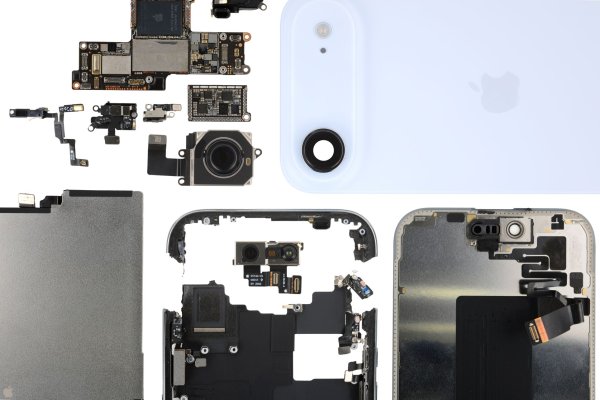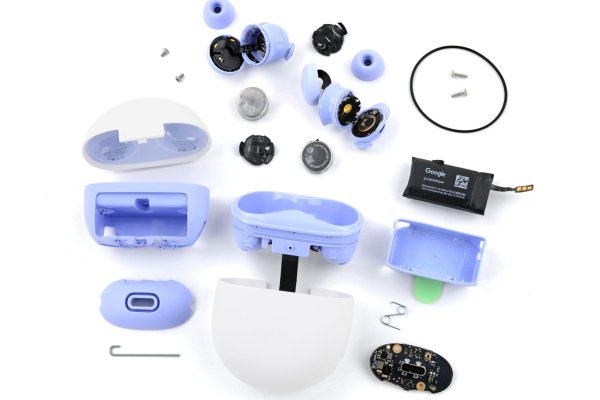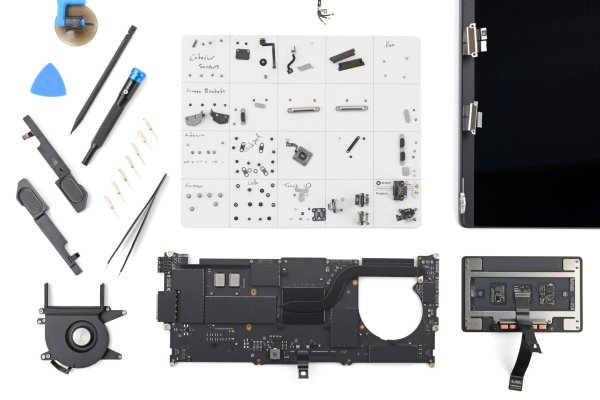When it comes to repair, we hate AirPods. They’ve scored 0 out of 10 every time we’ve taken them apart. To get inside, you have to cut open the plastic shell, which means that each bud’s lifespan is limited to the life of the battery inside it. That’s usually somewhere around 2-3 years of use.
We confirmed last month that the latest model of AirPods Pro, just like every one before, is disposable by design. And unfortunately, it’s a strategy unabashedly adopted by the army of AirPod clones we saw at CES, being hawked by booth reps who weren’t afraid to say, “This is a disposable product.”
But even if someone came out with an AirPod clone with easily replaceable batteries, you might not want it.

As much as I want to hate AirPods altogether, I have a confession: I love my AirPods Pro. They’re amazing. They’re always ready, just pop them in your ears and they’re connected. The noise-canceling and transparency modes (and the auto-switching between them) seem almost impossible in such tiny gadgets, and on top of all that they sound fantastic. Rival products just don’t come close. And that, too, is by design. A lot of it is down to their integration with the rest of the Apple ecosystem, and that’s where Apple locks out the competition.
Auto-switching
Put down your iPhone and pick up your iPad, press play on a YouTube video, and you’re already connected and listening. It doesn’t always work perfectly, but it usually does, and it means you can pretty much forget about the hassle of going into your audio settings and fussing with connections.
Non-Apple headphones can also do auto-switching, but Apple’s pair-once, listen-anywhere version is outstanding. Thanks to deep integration with Apple’s computers, you never really have to think about it again. The AirPods just connect to whichever device you’re using.
Reading out messages
Siri can read out your incoming messages and other notifications to you, but only if you’re using compatible headphones, which means AirPods and Apple’s other headphone brand, Beats.
“Announce Notifications,” as Apple calls it, can be super useful. You can listen to incoming texts without having to take out your phone, and you can respond to them with voice. You can even decline incoming calls with a shake of the head.

It’s a great accessibility feature, and also very good as a safety feature for cyclists, folks working in potentially hazardous environments, and for dog walkers who have particularly lively puppies that require all their attention and both their hands.
Unfortunately, Apple blocks any third-party headphones from accessing it. Why? Who knows? Apple could claim that it requires one of its H-series chips to work, or that something something security something, but really this is just audio being played through headphones, and audio being recorded from your headphone mics. It should work with whichever headphones you choose.
The Law
But wouldn’t it be great if you could just open up any old Bluetooth headphones near your iPhone and have them pair automatically? Or have them seamlessly switch between your Apple devices? Or to have AirPods also work just as well with non-Apple gear, like Android phones, the Switch and the Steam Deck, and Linux laptops?
Unfortunately, this trick requires Apple’s H-series headphone chips, which are only available in AirPods and Beats models. Apple’s argument would be that such a feature requires tight integration between hardware and software in order to pull it off, and that it should be allowed to profit from the seamless integration enabled by their proprietary chips. For a smaller company, that would be a great argument.

But Apple isn’t a small company. It’s one of the biggest companies in the world. In January 2025, Apple said that the iPhone had an installed base of 2.35 billion active devices, and that’s why the EC designates it as a “gatekeeper,” a company that controls so much of the market that it has to abide by strict rules that guarantee fair competition.
Apple is not above using its feature lock-in as a political weapon either. When it added a live-speech translation feature to the AirPods Pro with iOS 26, it withheld the feature from EU countries.
Apple has been fighting the EU for some time now over the Digital Markets Act (DMA). The DMA exists in part to stop “gatekeeper” tech companies like Facebook, Google, and Apple from using the sheer size of their huge platforms to distort the market, and to lock customers in.
In a September press release Apple attacked the DMA, blaming it for the delay of live translation, iPhone mirroring (mirroring your iPhone’s display on your Mac), and more, even though the DMA does not ban either or these directly.
The press release is definitely worth a read, as it ties itself in some nutso knots. For instance, according to Apple, by forcing companies to open up their features to other platforms, it somehow reduces choice. That is, if you could use all the AirPods’ features with any device, not just Apple devices, this would somehow count as less choice, not more.
Should Apple make its H-series chips available to other manufacturers, or open the specs up for third-party use? The DMA would seem to say yes, but as the law is still so young and untested, and because these huge US tech behemoths (many or most of them are US-based) don’t like being told what to do by EU regulators and are fighting back hard, the outcome remains to be seen.
The next chapter of this story just arrived this week. On November 4th, Apple announced that AirPods Live Translation will launch in the EU same time next month, in December.
Apple couldn’t pass up the chance to have another dig at the European Union, either. In the press release, it says that “Translation on AirPods was delayed for users in the EU due to the additional engineering work needed to comply with the requirements of the Digital Markets Act.”
As translation only works with devices running iOS 26, and with AirPods Pro versions 2 and 3, it seems that this ”additional engineering work” was not to make the new feature compatible with more headphones or phones. Perhaps—and this is just a guess—the need to upload your conversations to the cloud to process them fell afoul of something like the strict anti-recording laws in Germany.
If that is the case, then DMA compliance would have actually increased privacy for users, rather than undermining it as Apple claimed in its anti-EU rant.
Repairability
There’s a repairability angle in here too. If Apple is finally forced to open up all those sweet AirPods-only features to other makers, then we would no longer have to buy its disposable AirPods Pro to use them. Even in the new AirPods Pro 3, the batteries cannot be replaced, which means that they’re going to landfill after a few years (recycling is hard because those non-removable batteries can cause explosions).

Imagine instead a third-party version of the AirPods that could use all of Apple’s deep integration, only they had user-swappable batteries like the FairBuds.
If buyers had more options and choice, without having to give up AirPod features, the competition would force Apple to do better. But right now, the competition for AirPods is non-existent. No, there’s nothing else like AirPods, but only because Apple is cheating.





crwdns2947414:01crwdne2947414:0
Is Apple really cheating? Or is it just that other companies don’t want to try as hard, and so they get the government involved because they are sore losers? This is not cheating; this is innovating. If we want more instant-pairing earbuds, we need to not criticize Apple for “locking in” their technology to their own products. We should criticize Samsung, Google, and all the other earbud companies that they aren’t trying as hard as Apple. Should Apple make their AirPods more repairable? Of course, they should. But that doesn’t mean that they have to allow their competitors to profit off their innovation. As for the DMA, it definitely has some good points, but like everything, it isn’t perfect. Allowing people to sideload apps? If you want to do that, there is Android. You don’t get an iPhone to hack it; you buy an Android. There’s a reason why iPhones have the lowest malware infection rate in the industry. Is Apple perfect? Absolutely not. But the DMA isn’t either.
S. I. Dalton - crwdns2934203:0crwdne2934203:0